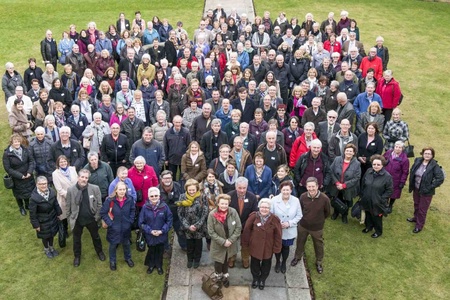The story of one of the world's most unique group of study participants and what life was like for them growing up has been told in a new online exhibition.
The Aberdeen Children of the 1950s are a group of more than 12,000 people who took part in a test when they were in primary school and have since gone on to contribute to dozens of important studies.
The goal of the original study was to discover the causes of learning disabilities. The children's test results were linked to other school records and to birth records in the Aberdeen Maternity and Neonatal Databank.
In the late 1990s the participants were traced and sent a postal questionnaire, with more than 7,000 of the Children of the 1950s replying giving information on their current health and a wide range of other topics. More information was then added from current medical records.
Today, researchers use the data collected from the children of the 1950s to investigate a wide range of questions about society.
The researchers have worked with members of the cohort, who are now in their 70s, to create an online exhibition exploring the history of the cohort study, and memories of 1950s Aberdeen
The exhibition includes copies of the actual tests they took, highlights of their 50-year reunion in 2016 and personal memories of daily life, holiday and pastimes of the era. It was funded by the Wellcome Trust and the University of Aberdeen ISSF fund.
Marj Johnston, Specialty doctor public health, NHS Grampian, and co-lead of the Aberdeen Children of the 1950s public engagement project, said: “I used the Aberdeen Children of the 1950s study for my PhD and so I was really pleased to be part of this exciting project alongside members of the study. I’ve learned a lot about the history of the city and I’m thankful to all the study members who made this exhibition possible.”
Aileen Walker is a member of the Aberdeen Children of the 1950s group who took the original test in the 1960s and was also co-curator of the exhibition. She said: “I was delighted to be a member of the Aberdeen Children of the 50s study and part of the exhibition project group as it was fascinating and fun for us to pull together all our memories of that era and reflect on how much we, life and society have changed since then.
“In the ‘50s our living conditions were basic, our pleasures simple but our lives were enriched by the love and support of family and friends nearby and a great sense of community spirit.”
Bill Walker, another member of the group and co-curator of the exhibition, added: “Initially my thoughts were focused on the changes that have taken place over the decades. However, memories - good or bad - are unique to each of us and so creating a list of A-Z memories seemed a more interesting approach.
“I dedicate this work to my family, hopefully along with other parties they will be interested and enjoy reading my memories of an Aberdeen Child of the 50s.”
The Exhibition can be viewed at https://exhibitions.abdn.ac.uk/university-collections/exhibits/show/aberdeens-children/cohort-origins


